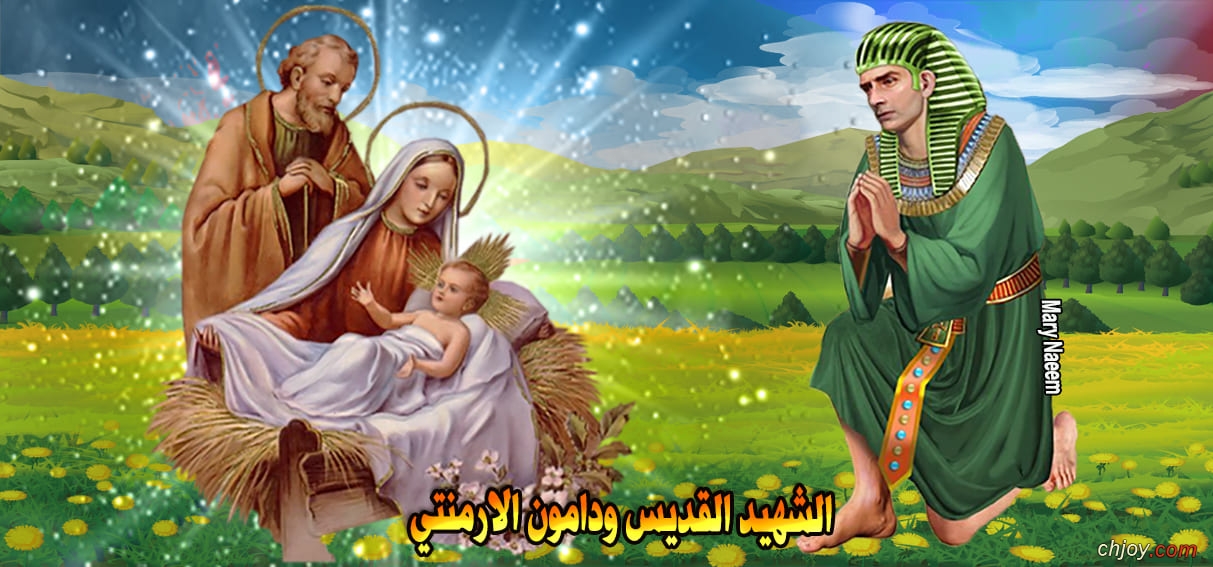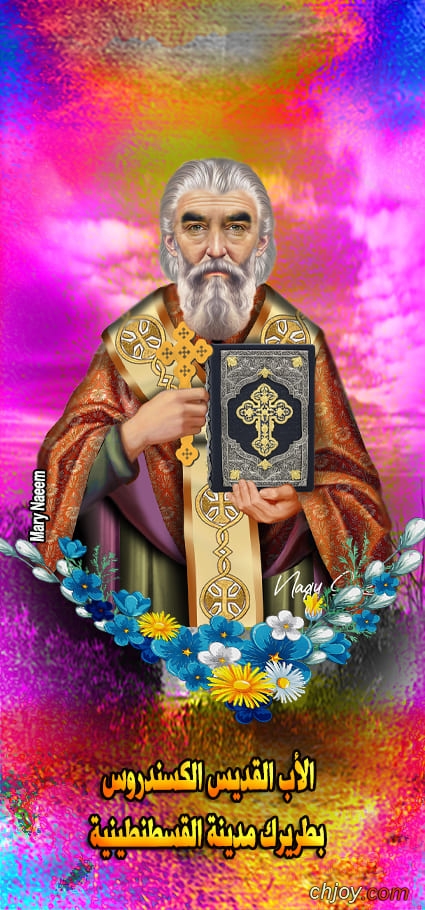
 |
 |
 |
 |
|
|
رقم المشاركة : ( 171231 ) | ||||
|
† Admin Woman †
|
 قداسة البابا تواضروس الثاني احذر من دوائر الخطر والسقوط أمام النفس. إنها ثلاث دوائر خطيرة: أولاً: الذات والسلطة أو الرئاسة والكرامة والبحث عن الشهرة والشعبية دون اتضاع أو مخافة. ثانيًا: المال والقنية والملكية أو التملك والشهوات الأرضية الترابية دون النظر إلى السماء أو المستقبل. ثالثًا: الجنس وشهوات الجسد العديدة بالإغراء والخيانة وسقطات العاطفة في مذلة ومهانة. والخلاصة: إنك لن تعرف ذاتك أو نفسك إذا عشت في البطالة أو الفردية أو هوس الكمال أو الإباحيات أو الخوف من الفشل أو الانغماس على مواقع التواصل الاجتماعي دون حدود حتى تتشوه نفسك وفكرك وتعيش خارج معرفة حقيقية لنفسك. انتبه. |
||||
|
|
|||||
|
|
رقم المشاركة : ( 171232 ) | ||||
|
† Admin Woman †
|
 قداسة البابا تواضروس الثاني مقال لقداسة البابا تواضروس الثاني في مجلة الكرازة أعظم نصيحة Editorial Article by H.H. Pope Tawadros II in Kiraza Magazine: The Greatest Advice On July 20, 1969, man walked on the moon for the first time in history. They asked the scientist who invented the rocket that carried the spacecraft there: “Now that we have reached the moon to explore it, is there another place we should strive to discover and reach?” The scientist paused and replied, “Yes, there is a place—the one inside our heads!” By this, he meant the human mind, soul, and ambitions. Despite the many specialized sciences, the knowledge of the human soul remains incomplete. Therefore, the phrase inscribed on the walls of one of the ancient Greek temples, “Know Thyself,” which was later explained by the philosopher Socrates, remains the greatest piece of human advice known to man. Knowing oneself involves a set of spiritual, internal, and existential dimensions that a person uses to fully, or nearly fully, discover themselves, identifying the talents, capabilities, skills, and thoughts that shape their personality with the aim of developing and enhancing them. Some psychologists identify six essential indicators to help you know yourself: 1. Value System: The values you cherish, such as helping others or creativity 2. Interest System: Your hobbies and the things that captivate you 3. Mood Type: Whether you are open, introverted, smiling, sharp-tempered, etc. 4. Activity Pattern: Whether you prefer the morning, enjoy staying up late, and at what time you are most active. 5. Goal Setting: The earlier you set your goals, the better. 6. Strengths and Weaknesses: Strengths signify your success and beyond The Book of Proverbs aptly describes that “a satisfied soul loathes the honeycomb” (27:7), meaning the soul that is satisfied with love, knowledge, contentment, success, and strength, while to the hungry soul every bitter thing is sweet. This highlights the importance of the books of wisdom such as Proverbs, Ecclesiastes, Song of Solomon, Job, and the Epistle of James, which provide readers with deeper understanding of themselves, their lives, and their times. It is spiritually beneficial to read these books regularly alongside other biblical readings. It is known that there are 12 psychological laws that help a person know themselves, and applying them can significantly change one’s life: 1. The Law of Inner Peace: Withdrawing from chaos is priceless. 2. The Law of Mental Intelligence: Ignoring someone reduces them to their true size, no matter who they are. 3. The Law of Letting Go: Not everything you give up is a loss; some things are the beginning of something better. 4. The Law of Self-Development: Find a place at the top for yourself because the bottom is overcrowded. 5. The Law of Self-Assertion: Occasionally update your rules and methods to become clear and distinctive to everyone. 6. The Law of Excellence: Create in your own style while being completely relaxed, and others will follow. 7. The Law of Challenge: Create a space for yourself among the greats and have it recognized. 8. The Law of Time Management: Be like a ship navigating the waves with knowledge, understanding, and serious study. 9. The Law of Goals: A life without a goal is like a body without a soul-both are worthless. 10. The Law of Awareness: If you don’t recognize your mistakes, you won’t learn what is right. 11. The Law of Learning: If you don’t suffer, you won’t learn. 12. The Law of Change: If you don’t change, you are wasting your life. Dear reader, you need to know, memorize, and apply these twelve laws throughout your life to understand even a little bit about yourself, comprehend your life, and succeed. The soul is deep, vast, elusive, and has needs just like the body. It requires appreciation, security, compassion, and also love. If we want to explain what is meant by “Know yourself,” we must understand the following: â—ڈ Know Your Human Reality: You were created in the image of God and are distinguished by two things: the first is thought, intellect, and creativity; the second is freedom in time and space. â—ڈ Know Your Personal Reality: There are different personality types such as social, leadership, calm, or perfection-seeking… You must fully understand your personality type. â—ڈ Know Your Life or Behavioral Reality: Therefore, I advise you to read about Gideon (Judges 7), Samson (Judges 16), St. Paul the Apostle (Galatians 1:11-17), or the Prodigal Son (Luke 15). All of this should be done in light of the living and active Word of God, sharper than any two-edged sword, piercing even to the division of soul and spirit, and discerning the thoughts and intents of the heart (Hebrews 4:12). Finally, I guide you to practical exercises to know yourself: 1. Reading: The Bible, cultural, artistic, and literary works, as well as biographies and memoirs. 2. Consultation, Friendship, and Dialogue: With elders, gathering knowledge from everyone. 3. Solitude, Meditation, Quietness, Prayer: Deep thinking, journaling, and writing in general. 4. Experience: Through travel, relationships, and all forms of human interactions under various circumstances. But beware of the danger zones where the soul can fall: â—ڈ First: The self and authority, or leadership and seeking fame and popularity without humility or reverence. â—ڈ Second: Wealth and possessions, or acquiring earthly and materialistic desires without looking towards heaven or the future. â—ڈ Third: Sexual desires and the many lusts of the body, with temptation, betrayal, and the pitfalls of emotions in humiliation and disgrace. In summary, if you do not know yourself, you may live in idleness, individuality, perfectionism, obsession, immorality, fear of failure, or excessive indulgence in social media without limits, causing your soul and mind to become distorted, leaving you living outside a true understanding of yourself. Be careful. |
||||
|
|
رقم المشاركة : ( 171233 ) | ||||
|
† Admin Woman †
|
 قداسة البابا تواضروس الثاني مقال لقداسة البابا تواضروس الثاني في مجلة الكرازة أعظم كلمتين الإنسان كائن ناطق يجيد صناعة الكلام، ومن خلال الكلام يتواصل البشر، ويتعلمون ويفهمون وينقلون الأخبار والأحداث والأفكار والمشاعر، ويكتبون الكتب والمقالات والأبحاث العلمية والأدبية والفنية، ويعبرون عما بداخلهم من حب أو حقد أو فكر أو أدب شعرًا أو نثرًا أو رواية أو قصص. ويقضي كل إنسان ساعات في كل يوم في الكلام سواء مع الله في الصلوات والتسابيح، أو مع البشر في قضاء الأعمال والأشغال العديدة.. ويصير محصول الكلام لدى الإنسان في تزايد مستمر بالقراءة والدراسة والتأليف والمطالعة والتأمل والكتابة بكل نوع.. ومكتوب “بِكَلاَمِكَ تَتَبَرَّرُ وَبِكَلاَمِكَ تُدَانُ” (مت 12: 37). ويقول معلم أولاد الملوك: كثيرًا ما تكلمت وندمت أما عن صمتي فلم أندم قط (القديس أرسانيوس). وتبرز قصة واقعية من قصص البرية المقدسة عندما سُئل الأنبا يوسف في القرن الرابع الميلادي عن ما هو أهم: الكلام أم الصمت؟ فأجاب إذا كان الكلام من أجل الله فهو جيد، وإن كان الصمت من أجل الله فهو جيد. وهذه حكمة آباء البرية. وبالطبع لا يمكن حصر كل كلام البشر بكل الحروف وفي كل اللغات، ولكن تبرز كلمتين بين كل الكلام تعتبر الأفضل والأعظم والأجمل والأروع في كل الأدبيات والمواقف الإنسانية المتعددة عند كل البشر في كل الأجيال والأزمان وإلى نهاية الدهر.. الكلمة الأولى هي: “حاضر” YES وهي كلمة الاستجابة والطاعة والموافقة على فعل شيء مناسب يصدر من شخص لآخر أو من شخص إلى مجموعة، ولا يهم من هو الكبير ومن هو الصغير.. ولكنها كلمة مريحة وذات موسيقى صوتية وفي كل اللغات بنغمة مبهجة عندما يسمعها الإنسان. والكلمة فيها خضوع وقبول محبب وعن طيب خاطر. ونطق هذه الكلمة يعبر عن إنكار للذات بالقبول الإيجابي، كما أنها تسهم في راحة المستمع لها وهدوئه وسلامه. وهذه الكلمة نراها في مواقف التربية ومواقف التعليم ومواقف العمل وهي مطلوبة جدًا لمسيرة الحياة وتقدمها. كما يتضح جمال هذه الكلمة عندما نعرف المضاد لها وهي كلمة “لا” والتي تعبر عن الرفض والامتناع والمعارضة، والتي لها وقع سلبي وربما متعب على أذن المستمع لها بسبب حدتها وقساوتها. وتذكر هذه الكلمة في مواقف عديدة في الكتاب المقدس سواء بالحرف أو بالقصد مثلما نقرأ في قصة بشارة أمنا العذراء مريم من قبل الملاك جبرائيل والتي أجابت في طاعة كاملة واتضاع بالغ: “هُوَذَا أَنَا أَمَةُ الرَّبِّ لِيَكُنْ لِي كَقَوْلِكَ” (لو 1: 38). نفس الموقف نجده عند إبراهيم أبو الآباء حين طلب منه الرب: “اذْهَبْ مِنْ أَرْضِكَ وَمِنْ عَشِيرَتِكَ وَمِنْ بَيْتِ أَبِيكَ إِلَى الأَرْضِ الَّتِي أُرِيكَ… فَذَهَبَ أَبْرَامُ كَمَا قَالَ لَهُ الرَّبُّ..” (تك 12: 1-4). أيضًا نفس الاستجابة في دعوة متى العشار حيث قال له الرب يسوع: “اتْبَعْنِي. فَقَامَ وَتَبِعَهُ” (مت 9: 9) وصار له تلميذًا. الكلمة الثانية هي: أخطأت/ أخطيت/ آسف/ أعتذر وكلها تعابير عن الندم على فعل أو قول شيء معين، وقد صدر عن الإنسان بقصد أو بدون قصد. والبعض يعتبر أن هذه الكلمة هي الأصعب على الإطلاق في قاموس البشر ويعتبرونها فعل ثقيل، ولذلك فإن الاعتذار يعتبر فن له معايير وأصول، وليس مجرد شيء نفعله لنكون مهذبين، ولكنه وسيلة لإظهار الاحترام والتعاطف مع الشخص أو الأفراد الذين تعرضوا لإساءة كنت أنا سببها أو مصدرها. وفي التقليد الرهباني القبطي يجتمع الآباء الرهبان مرتين كل يوم للصلاة الجماعية، الأولى في الرابعة فجرًا لصلوات نصف الليل والتسبحة اليومية، والثانية في الرابعة عصرًا لصلوات مزامير الغروب والنوم.. معنى ذلك أنهم يجتمعون كل 12 ساعة.. وتبدأ الصلوات في كل مرة بأن يصافح الآباء الرهبان بعضهم البعض قائلين: “أخطأت سامحني”، فربما صدر عن أحدهم أي فعل أو قول أو إشارة أساءت إلى آخر بأي صورة، ولذلك يعترف كل واحد أمام الآخرين بالخطأ ويطلب المسامحة. وفي القداس الإلهي وقبل أن يبدأ الكاهن الصلوات يطلب من كل الحاضرين قائلاً: أخطأت سامحوني، ليكون صافي النية. وإذا كان لأحد شكوى ما، فإنه ينبغي على الكاهن أن يقابله ويجلس معه ويبحث ما يقوله ويعتذر له إن كان هناك ما يوجب الاعتذار ودون مجادلة أو تبرير. إن الاحترام تربية وليس ضعفًا، وكذلك الاعتذار أدب وليس إهانة أو مذلة. ويجب أن نعلم أن “الاعتذار البارد” يعتبر إهانة ثانية ويؤدي إلى عواقب وخيمة. ويعتبر مثل الابن الضال أروع وأرفع ما كتب عن شجاعة الاعتذار وصدقه، حينما قال الابن العائد والتائب: “أَخْطَأْتُ إِلَى السَّمَاءِ وَقُدَّامَكَ، وَلَسْتُ مُسْتَحِقًّا بَعْدُ أَنْ أُدْعَى لَكَ ابْنًا” (لو 15: 21) ونال باعتذاره الحقيقي غفرانًا وحنانًا ورقة وعذوبة. كذلك في قصة الفريسي والعشار (لو 18: 9-14). عندما صعدا إلى الهيكل للصلاة حيث كانت صلاة الفريسي كلها كبرياء وذات وعجرفة، أما العشار فوقف من بعيد لا يشاء أن يرفع عينيه نحو السماء بل قرع صدره قائلاً: اللهم ارحمني أنا الخاطئ.. وعاد إلى بيته مبررًا دون الفريسي. إنه لم ينظر إلى الآخرين، بل أدان نفسه بمعيار الله وأدرك أنه كان مذنبًا خاطئًا. وفي قصة نابال وأبيجايل والتي تصرفت فيها هذه الزوجة بحكمة وقدمت اعتذارًا عمليًا عن تصــرف زوجهــــا الأحـمــق أمـام داود النبــي (1صموئيل 25)، الذي باركها لهذه الفطنة والحكمة المتضمنة اعتذارًا من القلب ونجحت في مهمتها وأوقفت مذبحة شديدة.. والخلاصة أن هاتين الكلمتين: “حاضر وأخطيت”، هما عماد الحياة سواء في الأسرة أو الكنيسة أو الخدمة أو المجتمع، وهما سبب سلامة الحياة وصيانتها واستمرارها الصحيح. ويا بخت من يستعملهما دائمًا في حياته. |
||||
|
|
رقم المشاركة : ( 171234 ) | ||||
|
† Admin Woman †
|
 قداسة البابا تواضروس الثاني الإنسان كائن ناطق يجيد صناعة الكلام، ومن خلال الكلام يتواصل البشر، ويتعلمون ويفهمون وينقلون الأخبار والأحداث والأفكار والمشاعر، ويكتبون الكتب والمقالات والأبحاث العلمية والأدبية والفنية، ويعبرون عما بداخلهم من حب أو حقد أو فكر أو أدب شعرًا أو نثرًا أو رواية أو قصص. ويقضي كل إنسان ساعات في كل يوم في الكلام سواء مع الله في الصلوات والتسابيح، أو مع البشر في قضاء الأعمال والأشغال العديدة.. ويصير محصول الكلام لدى الإنسان في تزايد مستمر بالقراءة والدراسة والتأليف والمطالعة والتأمل والكتابة بكل نوع.. ومكتوب “بِكَلاَمِكَ تَتَبَرَّرُ وَبِكَلاَمِكَ تُدَانُ” (مت 12: 37). ويقول معلم أولاد الملوك: كثيرًا ما تكلمت وندمت أما عن صمتي فلم أندم قط (القديس أرسانيوس). وتبرز قصة واقعية من قصص البرية المقدسة عندما سُئل الأنبا يوسف في القرن الرابع الميلادي عن ما هو أهم: الكلام أم الصمت؟ فأجاب إذا كان الكلام من أجل الله فهو جيد، وإن كان الصمت من أجل الله فهو جيد. وهذه حكمة آباء البرية. وبالطبع لا يمكن حصر كل كلام البشر بكل الحروف وفي كل اللغات، ولكن تبرز كلمتين بين كل الكلام تعتبر الأفضل والأعظم والأجمل والأروع في كل الأدبيات والمواقف الإنسانية المتعددة عند كل البشر في كل الأجيال والأزمان وإلى نهاية الدهر.. |
||||
|
|
رقم المشاركة : ( 171235 ) | ||||
|
† Admin Woman †
|
 قداسة البابا تواضروس الثاني “حاضر” YES وهي كلمة الاستجابة والطاعة والموافقة على فعل شيء مناسب يصدر من شخص لآخر أو من شخص إلى مجموعة، ولا يهم من هو الكبير ومن هو الصغير.. ولكنها كلمة مريحة وذات موسيقى صوتية وفي كل اللغات بنغمة مبهجة عندما يسمعها الإنسان. والكلمة فيها خضوع وقبول محبب وعن طيب خاطر. ونطق هذه الكلمة يعبر عن إنكار للذات بالقبول الإيجابي، كما أنها تسهم في راحة المستمع لها وهدوئه وسلامه. وهذه الكلمة نراها في مواقف التربية ومواقف التعليم ومواقف العمل وهي مطلوبة جدًا لمسيرة الحياة وتقدمها. كما يتضح جمال هذه الكلمة عندما نعرف المضاد لها وهي كلمة “لا” والتي تعبر عن الرفض والامتناع والمعارضة، والتي لها وقع سلبي وربما متعب على أذن المستمع لها بسبب حدتها وقساوتها. وتذكر هذه الكلمة في مواقف عديدة في الكتاب المقدس سواء بالحرف أو بالقصد مثلما نقرأ في قصة بشارة أمنا العذراء مريم من قبل الملاك جبرائيل والتي أجابت في طاعة كاملة واتضاع بالغ: “هُوَذَا أَنَا أَمَةُ الرَّبِّ لِيَكُنْ لِي كَقَوْلِكَ” (لو 1: 38). نفس الموقف نجده عند إبراهيم أبو الآباء حين طلب منه الرب: “اذْهَبْ مِنْ أَرْضِكَ وَمِنْ عَشِيرَتِكَ وَمِنْ بَيْتِ أَبِيكَ إِلَى الأَرْضِ الَّتِي أُرِيكَ… فَذَهَبَ أَبْرَامُ كَمَا قَالَ لَهُ الرَّبُّ..” (تك 12: 1-4). أيضًا نفس الاستجابة في دعوة متى العشار حيث قال له الرب يسوع: “اتْبَعْنِي. فَقَامَ وَتَبِعَهُ” (مت 9: 9) وصار له تلميذًا. |
||||
|
|
رقم المشاركة : ( 171236 ) | ||||
|
† Admin Woman †
|
 قداسة البابا تواضروس الثاني أخطأت/ أخطيت/ آسف/ أعتذر وكلها تعابير عن الندم على فعل أو قول شيء معين، وقد صدر عن الإنسان بقصد أو بدون قصد. والبعض يعتبر أن هذه الكلمة هي الأصعب على الإطلاق في قاموس البشر ويعتبرونها فعل ثقيل، ولذلك فإن الاعتذار يعتبر فن له معايير وأصول، وليس مجرد شيء نفعله لنكون مهذبين، ولكنه وسيلة لإظهار الاحترام والتعاطف مع الشخص أو الأفراد الذين تعرضوا لإساءة كنت أنا سببها أو مصدرها. وفي التقليد الرهباني القبطي يجتمع الآباء الرهبان مرتين كل يوم للصلاة الجماعية، الأولى في الرابعة فجرًا لصلوات نصف الليل والتسبحة اليومية، والثانية في الرابعة عصرًا لصلوات مزامير الغروب والنوم.. معنى ذلك أنهم يجتمعون كل 12 ساعة.. وتبدأ الصلوات في كل مرة بأن يصافح الآباء الرهبان بعضهم البعض قائلين: “أخطأت سامحني”، فربما صدر عن أحدهم أي فعل أو قول أو إشارة أساءت إلى آخر بأي صورة، ولذلك يعترف كل واحد أمام الآخرين بالخطأ ويطلب المسامحة. وفي القداس الإلهي وقبل أن يبدأ الكاهن الصلوات يطلب من كل الحاضرين قائلاً: أخطأت سامحوني، ليكون صافي النية. وإذا كان لأحد شكوى ما، فإنه ينبغي على الكاهن أن يقابله ويجلس معه ويبحث ما يقوله ويعتذر له إن كان هناك ما يوجب الاعتذار ودون مجادلة أو تبرير. إن الاحترام تربية وليس ضعفًا، وكذلك الاعتذار أدب وليس إهانة أو مذلة. ويجب أن نعلم أن “الاعتذار البارد” يعتبر إهانة ثانية ويؤدي إلى عواقب وخيمة. ويعتبر مثل الابن الضال أروع وأرفع ما كتب عن شجاعة الاعتذار وصدقه، حينما قال الابن العائد والتائب: “أَخْطَأْتُ إِلَى السَّمَاءِ وَقُدَّامَكَ، وَلَسْتُ مُسْتَحِقًّا بَعْدُ أَنْ أُدْعَى لَكَ ابْنًا” (لو 15: 21) ونال باعتذاره الحقيقي غفرانًا وحنانًا ورقة وعذوبة. كذلك في قصة الفريسي والعشار (لو 18: 9-14). عندما صعدا إلى الهيكل للصلاة حيث كانت صلاة الفريسي كلها كبرياء وذات وعجرفة، أما العشار فوقف من بعيد لا يشاء أن يرفع عينيه نحو السماء بل قرع صدره قائلاً: اللهم ارحمني أنا الخاطئ.. وعاد إلى بيته مبررًا دون الفريسي. إنه لم ينظر إلى الآخرين، بل أدان نفسه بمعيار الله وأدرك أنه كان مذنبًا خاطئًا. وفي قصة نابال وأبيجايل والتي تصرفت فيها هذه الزوجة بحكمة وقدمت اعتذارًا عمليًا عن تصــرف زوجهــــا الأحـمــق أمـام داود النبــي (1صموئيل 25)، الذي باركها لهذه الفطنة والحكمة المتضمنة اعتذارًا من القلب ونجحت في مهمتها وأوقفت مذبحة شديدة.. والخلاصة أن هاتين الكلمتين: “حاضر وأخطيت”، هما عماد الحياة سواء في الأسرة أو الكنيسة أو الخدمة أو المجتمع، وهما سبب سلامة الحياة وصيانتها واستمرارها الصحيح. ويا بخت من يستعملهما دائمًا في حياته. |
||||
|
|
رقم المشاركة : ( 171237 ) | ||||
|
† Admin Woman †
|
 قداسة البابا تواضروس الثاني مقال لقداسة البابا تواضروس الثاني في مجلة الكرازة أعظم كلمتين Editorial Article by H.H. Pope Tawadros II in Kiraza Magazine: The Two Greatest Words Humans are speaking beings who excel at crafting words. Through speech, people communicate, learn, understand, and convey news, events, ideas, and emotions. They write books, articles, and scientific, literary, and artistic research; and express their inner feelings of love, hatred, and thoughts; and produce literature through poetry, prose, novels, or stories. Every person spends hours each day speaking, whether with God in prayers and hymns or with others while carrying out various tasks and jobs. The amount of words a person accumulates continuously increases through reading, studying, writing, and meditating. As it is written, “For by your words you will be justified, and by your words you will be condemned” (Matthew 12:37, NKJV). Saint Arsenius, the teacher of Kings’ Children, said, “Many times I spoke and regretted it; as for keeping silent, I never regretted it.” A real-life story from the holy wilderness stands out when Abba Joseph was asked in the fourth century AD whether speaking or silence was more important. He replied, “If speaking is for God’s sake, it is good, and if silence is for God’s sake, it is good.” This is the wisdom of the fathers of the wilderness. Of course, it is impossible to count all human words in every language, but two words stand out as the best, greatest, most beautiful, and most wonderful in all human literature and various human situations across all generations and ages to the end of time. The First Word: “Yes” This is the word for responsiveness, obedience, and agreement to do something appropriately requested by one person to another or from a person to a group. It does not matter who is superior or inferior. It is a comforting word with a melodious sound in all languages and a joyful tone when heard. The word signifies submissive acceptance willingly and gladly. Saying this word expresses self-denial through positive acceptance, contributing to the listener’s comfort, tranquility, and peace. This word is seen in many contexts in education, teaching, and work situations. It is crucial for the course of life and its progress. The beauty of this word becomes clear when we consider its opposite: “No,” which expresses rejection, abstention, and opposition. It has a negative, possibly harsh, impact on the listener. This word appears in many situations in the Bible, whether literally or implied. For example, in the Annunciation to our mother, the Virgin Mary, by the angel Gabriel, she responded with complete obedience and profound humility: “Behold the maidservant of the Lord! Let it be to me according to your word” (Luke 1:38). The same response is seen with Abraham, the father of the patriarchs, when the Lord asked him: “Get out of your country, from your family and from your father’s house, to a land that I will show you… So Abram departed as the Lord had spoken to him…” (Genesis 12:1-4). The same response is seen in the calling of Matthew the tax collector when the Lord Jesus said to him: “Follow Me. So he arose and followed Him” (Matthew 9:9) and became His disciple. The Second Word: “I have sinned” / “Sorry” / “I Apologize” These are expressions of regret for doing or saying something specific, whether intentionally or unintentionally. Some consider this word to be the most challenging in the human lexicon and consider it a heavy act. Therefore, apologizing is regarded as an art with standards and principles, not just something we do to be polite. It is a means to show respect and empathy toward the person or people who were wronged because of something I said or did. In the Coptic monastic tradition, monks gather twice daily for communal prayer, first at 4:00 AM for the Agpeya midnight prayers and the daily midnight praise, and second at 4:00 PM for the Vespers Psalms (Vespers, Compline, and Veil prayers from the Agpeya). This means they gather every 12 hours. Each time, the prayers begin with the monks greeting each other, saying, “I have sinned, forgive me,” in case any of them might have done, said, or indicated something that offended another in any way. Thus, each one acknowledges his error before others and asks for forgiveness. In the Divine Liturgy, before the priest begins the prayers, he asks all present, saying: “I have sinned, forgive me,” to have a clear conscience. If anyone has a complaint, the priest should meet with them, discuss what they have to say, and apologize if necessary, without argument or justification. Respect is a matter of upbringing, not weakness, and apologizing is a matter of manners, not humiliation or disgrace. It is important to know that a “cold apology” is a second insult and leads to dire consequences. The story of the prodigal son is the most sublime and highest example of the courage and sincerity of an apology. When the returning and repentant son said: “Father, I have sinned against heaven and in your sight, and am no longer worthy to be called your son” (Luke 15:21), he received forgiveness, compassion, tenderness, and delightfulness. Likewise, in the story of the pharisee and the tax collector (Luke 18:9-14), when they both went up to the temple to pray, the Pharisee’s prayer was full of pride and arrogance, while the tax collector stood afar off, not daring to lift his eyes to heaven, but beat his breast, saying, “God, be merciful to me a sinner!” The tax collector went down to his house justified, rather than the Pharisee. He did not compare himself to others but judged himself against God’s standards, realizing he was a guilty sinner. In the story of Nabal and Abigail, this wife acted wisely and offered a practical apology for her foolish husband’s behavior in front of David the prophet (1 Samuel 25), who blessed her for her prudence and wisdom, which included a heartfelt apology that succeeded in her mission and prevented a severe massacre. In conclusion, these two words, “Yes” and “I have sinned,” are the pillars of life, whether in family, church, service, or society. They are the reason for life’s peace, preservation, and proper continuity. Blessed is the one who always uses them in his life. |
||||
|
|
رقم المشاركة : ( 171238 ) | ||||
|
† Admin Woman †
|
الشهيد القديس ودامون الارمنتي  |
||||
|
|
رقم المشاركة : ( 171239 ) | ||||
|
† Admin Woman †
|
الأب القديس الكسندروس بطريرك مدينة القسطنطينية  |
||||
|
|
رقم المشاركة : ( 171240 ) | ||||
|
† Admin Woman †
|
يسوع يسندهم عند كل التجارب ويحملهم على كتفيه الى بر الامان  |
||||